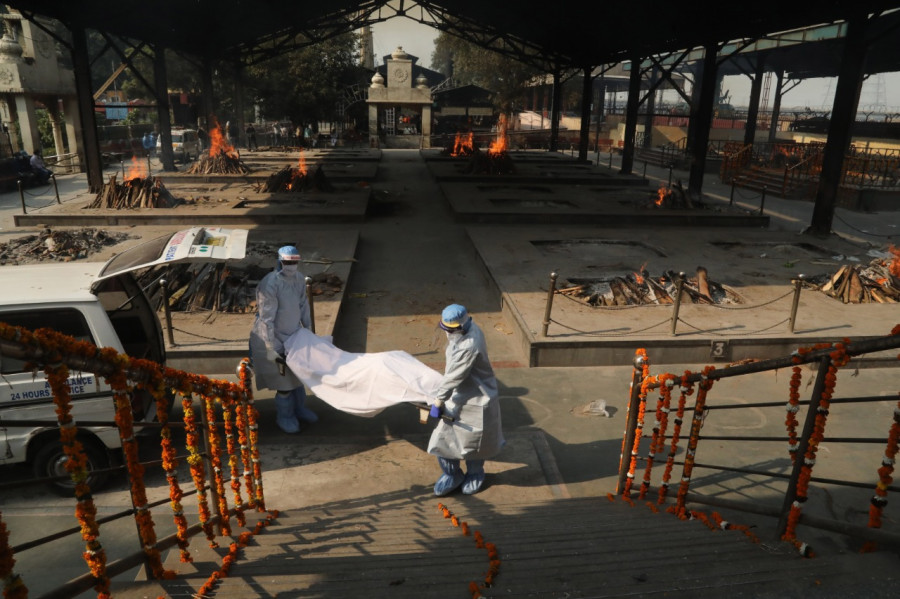Columns
Modi's Covid fiasco
The Bharatiya Janata Party’s denialism is costing thousands of lives daily in India.
Jagadish Prasad Bist
India for a few weeks now has been seeing a tsunami of Covid-19 cases. The country has surpassed all other nations in terms of daily positive cases: On Friday alone, more than 380,000 positive cases were recorded. The country has for over a week set, and subsequently broken, the global record of daily Covid-19 cases. The situation can't get any worse: Hospitals are overflowing with coronavirus patients, the shortage of oxygen is acute, people are waiting for others to die to get a bed in the hospital, and bodies are piling up at cremation centres. Worst of all, people are not even getting space to burn dead bodies.
The situation did not happen overnight. It reflects the failure of Indian Prime Minister Narendra Modi’s handling of the Covid crisis. Health workers and scientists have been warning for a long time not to let people gather in large numbers. But Modi’s Hindu nationalist ideology and election rallies sprinkled petrol on the insidiously burning situation; now, it is spreading like wildfire.
The number of daily cases at the beginning of April was near 50,000. Since then, Modi himself and his close aides have been spreading misinformation. His health minister believes that cow urine is a panacea for Covid-19 related problems, and election and religious rallies involving millions of people were shambolically organised. The recent election rallies and Maha Kumbha, a Hindu festival, where millions of Hindu devotees gathered to pray in the Ganga River, are the major causes of this fiasco.
The current situation has shown how fragile and weak Modi´s administration is. He has long been ruling the country with a two-thirds majority government. He has long been arguing that his country has developed the health infrastructure to global standards under his leadership, and that they are handling the current crisis well. However, the current scenario is telling a different story—the health infrastructure is very weak and dilapidated.
There’s nothing that the government with a two-thirds majority could not do to contain this virus—from proposing new bills for health infrastructure to imposing restrictions on mass gatherings. However, Modi´s escapist fantasy and denialism are costing thousands of lives daily in India. With this, Modi has joined the failure gang of former United States president Donald Trump and Brazilian President Jair Bolsonaro. All of them ignored the risks and encouraged people not to take this seriously. All in all, the Covid crisis in India is nothing but the Modi government's failure.
Modi had also been arguing that his government has performed exceptionally in the vaccination drive and that they hold sufficient stocks to jab their citizens. The situation does not show any such progress but a weak vaccination campaign. This failure to control this epidemic is not a threat only to India but also to the global economy. More than that, the immediate threat is to South Asia. The spillover to the neighbours presages economic and health crises in this region.
India hosts millions of migrant workers from neighbouring countries such as Nepal, Bhutan and Bangladesh. We saw a shutdown of the economy, hunger and unemployment causing a stampede of migrant workers through the borders last year. This created a major health crisis in neighbouring countries. This time, things are more precarious. The borders were closed last time, but there is currently free movement of people. More importantly, if South Asian countries start seeing positive caseloads like they are having in India, the weak and dilapidated health infrastructure in these countries could collapse overnight.
What is more important here is the supply of medical equipment and medicines from India to these neighbouring countries. Countries such as Nepal, Bhutan and Bangladesh largely depend on supplies from India. Now, India is halting shipments to other countries as it is experiencing shortages for its own citizen. This is going to create another health havoc in this region.
On the economic front, such precipitously increasing daily cases is causing governments to impose lockdowns again. This is going to force migrant workers to return to their homes, triggering rural poverty and disease. To stop this menace, South Asian countries with open borders with India need to activate all possible health units at the border. They should put testing measures in place, manage quarantines and health facilities at the border for positive cases, and strictly implement safety measures. South Asia now more than ever needs help from the developed countries with respect to vaccination, test kits and medical equipment to break the chain and get the region back on its feet.




 8.54°C Kathmandu
8.54°C Kathmandu.jpg)















